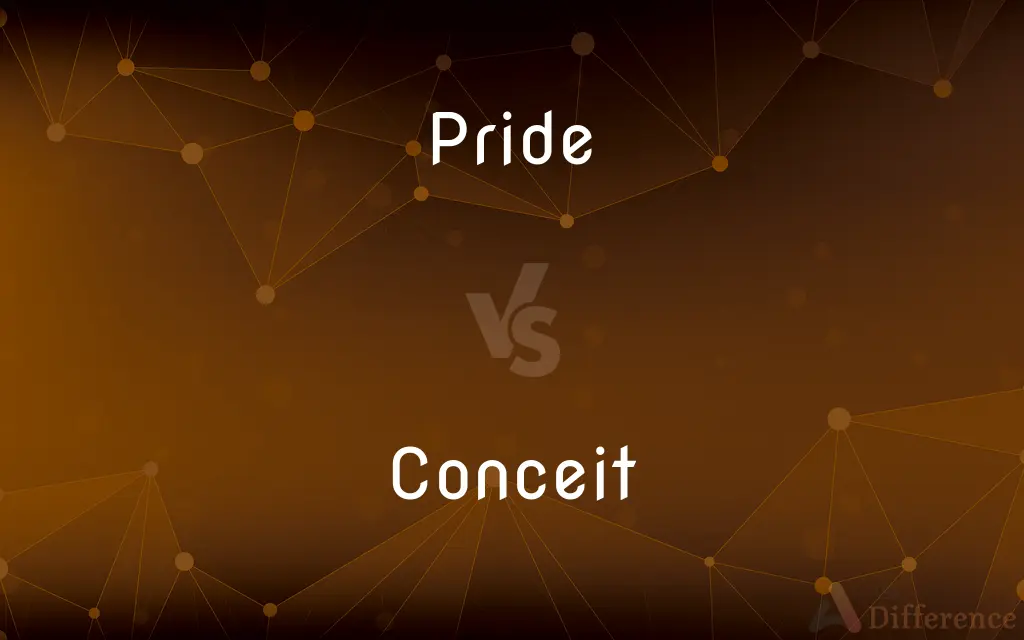Pride vs. Conceit — What's the Difference?
Edited by Tayyaba Rehman — By Maham Liaqat — Updated on March 26, 2024
Pride reflects satisfaction from one's achievements, while conceit is excessive appreciation of oneself beyond reality.

Difference Between Pride and Conceit
Table of Contents
ADVERTISEMENT
Key Differences
Pride is a feeling of satisfaction derived from one's own achievements, the achievements of those with whom one is closely associated, or from qualities or possessions that are widely admired. It is often seen as a positive emotion when it motivates individuals to maintain or improve their actions or character. On the other hand, conceit is an excessive pride in oneself, marked by an overinflated sense of one's abilities or worth. It tends to be perceived negatively because it implies a lack of recognition or respect for others.
While pride can be based on real achievements and qualities and can foster a sense of accomplishment and self-worth, conceit often involves boasting and a superiority complex that is not always grounded in reality. Pride allows for humility and the recognition of the contributions of others, whereas conceit overlooks the role of others and external factors in one's success.
Pride, when balanced, encourages individuals to strive for excellence and achieve their best without diminishing others. Conversely, conceit can lead to isolation, as it alienates individuals from their peers due to the perceived arrogance and unwarranted self-importance.
In social interactions, pride can enhance one's reputation and relationships, as it can be a source of inspiration and respect when displayed in moderation. Conceit, however, tends to damage relationships and one's reputation, as it is often associated with a lack of empathy and an inability to value others properly.
Although pride and conceit can both influence an individual's self-perception and behavior, the key difference lies in their impact on others and on oneself. Pride, when it is not excessive, can be a constructive force, while conceit is almost universally destructive and counterproductive to personal growth and relationships.
ADVERTISEMENT
Comparison Chart
Definition
Satisfaction from personal achievements or qualities.
Excessive pride in oneself, not grounded in reality.
Perception
Generally positive, if moderate.
Negative, associated with arrogance.
Impact on Relationships
Can be positive, fostering respect and admiration.
Often negative, leading to alienation and disrespect.
Basis
Real achievements and qualities.
Often inflated or unfounded beliefs about oneself.
Role in Personal Growth
Can motivate self-improvement and achievement.
Hinders growth by ignoring the need for improvement.
Compare with Definitions
Pride
Feeling of satisfaction from one's achievements.
She felt a deep sense of pride after completing her first marathon.
Conceit
Excessive pride in oneself, not always based on reality.
His conceit was evident in the way he disregarded others' advice.
Pride
Recognizing the worth of one's own or another's achievements.
His pride in his children's accomplishments was evident.
Conceit
An attitude reflecting an inflated self-image.
His conceit alienated him from his colleagues.
Pride
An acknowledgment of one's own value and that of others.
His pride in his heritage inspired him to learn more about his ancestry.
Conceit
Ignoring the role of others and external factors in one's success.
In his conceit, he failed to acknowledge his mentor's contributions.
Pride
A positive emotion reflecting self-respect.
Taking pride in her work, she always delivered her best.
Conceit
Belief in one's superiority without sufficient basis.
Conceit led her to underestimate the complexity of the task.
Pride
Encourages humility and the recognition of others' contributions.
Despite her success, she remained humble and full of pride for her team.
Conceit
Hinders personal growth by fostering an unwarranted self-importance.
Her conceit stopped her from seeking the feedback she needed to improve.
Pride
Pride is positive emotional response or attitude to something with an intimate connection to oneself, due to its perceived value. Oxford defines it amongst other things as "the quality of having an excessively high opinion of oneself or one's own importance" This may be related to one's own abilities or achievements, positive characteristics of friends or family, or one's country.
Conceit
In modern literary criticism, more common with genre fiction, conceit often means an extended rhetorical device, summed up in a short phrase, that refers to a situation which either does not exist, or exists rarely, but is needed for the plot. "Faster than light travel" and "superior alien science" are examples from science fiction; the "hardboiled private gumshoe" is an example from detective stories.
Pride
A sense of one's own proper dignity or value; self-respect.
Conceit
Excessive pride in oneself
He was puffed up with conceit
Pride
Pleasure or satisfaction taken in an achievement, possession, or association
Parental pride.
Conceit
An ingenious or fanciful comparison or metaphor
The idea of the wind's singing is a prime romantic conceit
Pride
Arrogant or disdainful conduct or treatment; haughtiness.
Conceit
Unduly favorable estimation of one's own abilities or worth; overly positive self-regard.
Pride
A cause or source of pleasure or satisfaction; the best of a group or class
These soldiers were their country's pride.
Conceit
(Archaic) Estimation or opinion of something, especially when favorable.
Pride
The most successful or thriving condition; prime
The pride of youth.
Conceit
A witty expression or fanciful idea
"opinionated and very funny in his conceits" (Paul Theroux).
Pride
An excessively high opinion of oneself; conceit.
Conceit
A fanciful poetic image, especially an elaborate or exaggerated comparison.
Pride
Mettle or spirit in horses.
Conceit
(Obsolete) The result of intellectual activity; a thought or an opinion.
Pride
A flamboyant or impressive group
A pride of acrobats.
Conceit
A decorative article; a knickknack.
Pride
To indulge (oneself) in a feeling of pleasure or satisfaction
I pride myself on this beautiful garden.
Conceit
An extravagant, fanciful, and elaborate construction or structure
"a bulky stone conceit with its paws clenched" (Edie Meidev).
Pride
The quality or state of being proud; an unreasonable overestimation of one's own superiority in terms of talents, looks, wealth, importance etc., which manifests itself in lofty airs, distance, reserve and often contempt of others.
Conceit
Chiefly British To take a fancy to.
Pride
A sense of one's own worth, and scorn for what is beneath or unworthy of oneself; lofty self-respect; noble self-esteem; elevation of character; dignified bearing; rejection of shame
He took pride in his work.
He had pride of ownership in his department.
Conceit
(Obsolete) To understand; conceive.
Pride
Proud or disdainful behavior or treatment; insolence or arrogance of demeanor; haughty bearing and conduct; insolent exultation.
Conceit
(obsolete) Something conceived in the mind; an idea, a thought.
Pride
That of which one is proud; that which excites boasting or self-congratulation; the occasion or ground of self-esteem, or of arrogant and presumptuous confidence, as beauty, ornament, noble character, children, etc.
Conceit
The faculty of conceiving ideas; mental faculty; apprehension.
A man of quick conceit
Pride
Show; ostentation; glory.
Conceit
Quickness of apprehension; active imagination; lively fancy.
Pride
Highest pitch; elevation reached; loftiness; prime; glory.
Conceit
(obsolete) Opinion, (neutral) judgment.
Pride
Consciousness of power; fullness of animal spirits; mettle; wantonness.
Conceit
Esteem, favourable opinion.
Pride
(zoology) The small European lamprey species Petromyzon branchialis.
Conceit
(countable) A novel or fanciful idea; a whim.
Pride
(reflexive) To take or experience pride in something; to be proud of it.
I pride myself on being a good judge of character.
Conceit
An ingenious expression or metaphorical idea, especially in extended form or used as a literary or rhetorical device.
Pride
A small European lamprey (Petromyzon branchialis); - called also prid, and sandpiper.
Conceit
(uncountable) Overly high self-esteem; vain pride; hubris.
Pride
The quality or state of being proud; inordinate self-esteem; an unreasonable conceit of one's own superiority in talents, beauty, wealth, rank, etc., which manifests itself in lofty airs, distance, reserve, and often in contempt of others.
Those that walk in pride he is able to abase.
Pride that dines on vanity sups on contempt.
Conceit
Design; pattern.
Pride
A sense of one's own worth, and abhorrence of what is beneath or unworthy of one; lofty self-respect; noble self-esteem; elevation of character; dignified bearing; proud delight; - in a good sense.
Thus to relieve the wretched was his pride.
A people which takes no pride in the noble achievements of remote ancestors will never achieve anything worthy to be remembered with pride by remote descendants.
Conceit
(obsolete) To form an idea; to think.
Pride
Proud or disdainful behavior or treatment; insolence or arrogance of demeanor; haughty bearing and conduct; insolent exultation; disdain.
Let not the foot of pride come against me.
That hardly we escaped the pride of France.
Conceit
To conceive.
Pride
That of which one is proud; that which excites boasting or self-gratulation; the occasion or ground of self-esteem, or of arrogant and presumptuous confidence, as beauty, ornament, noble character, children, etc.
Lofty trees yclad with summer's pride.
I will cut off the pride of the Philistines.
A bold peasantry, their country's pride.
Conceit
That which is conceived, imagined, or formed in the mind; idea; thought; image; conception.
In laughing, there ever procedeth a conceit of somewhat ridiculous.
A man wise in his own conceit.
Pride
Show; ostentation; glory.
Pride, pomp, and circumstance of glorious war.
Conceit
Faculty of conceiving ideas; mental faculty; apprehension; as, a man of quick conceit.
How often, alas! did her eyes say unto me that they loved! and yet I, not looking for such a matter, had not my conceit open to understand them.
Pride
Highest pitch; elevation reached; loftiness; prime; glory; as, to be in the pride of one's life.
A falcon, towering in her pride of place.
Conceit
Quickness of apprehension; active imagination; lively fancy.
His wit's as thick as Tewksbury mustard; there's more conceit in him than is in a mallet.
Pride
To indulge in pride, or self-esteem; to rate highly; to plume; - used reflexively.
Pluming and priding himself in all his services.
Conceit
A fanciful, odd, or extravagant notion; a quant fancy; an unnatural or affected conception; a witty thought or turn of expression; a fanciful device; a whim; a quip.
On his way to the gibbet, a freak took him in the head to go off with a conceit.
Some to conceit alone their works confine,And glittering thoughts struck out at every line.
Tasso is full of conceits . . . which are not only below the dignity of heroic verse but contrary to its nature.
Pride
To be proud; to glory.
Conceit
An overweening idea of one's self; vanity.
Plumed with conceit he calls aloud.
Pride
A feeling of self-respect and personal worth
Conceit
Design; pattern.
Pride
Satisfaction with your (or another's) achievements;
He takes pride in his son's success
Conceit
To conceive; to imagine.
The strong, by conceiting themselves weak, are therebly rendered as inactive . . . as if they really were so.
One of two bad ways you must conceit me,Either a coward or a flatterer.
Pride
The trait of being spurred on by a dislike of falling below your standards
Conceit
To form an idea; to think.
Those whose . . . vulgar apprehensions conceit but low of matrimonial purposes.
Pride
A group of lions
Conceit
Feelings of excessive pride
Pride
Be proud of;
He prides himself on making it into law school
Conceit
The trait of being vain and conceited
Common Curiosities
How can pride be positive?
Pride can be positive when it motivates individuals to maintain or improve their actions or character and is expressed in moderation.
What is pride?
Pride is a feeling of satisfaction and self-respect that comes from recognizing one's own achievements or qualities.
Is it possible to have pride without conceit?
Yes, it is possible to have pride without conceit by maintaining humility and a realistic assessment of one's achievements and worth.
What is conceit?
Conceit is an excessive pride in oneself, characterized by an inflated sense of one's abilities or worth.
Can pride turn into conceit?
Yes, pride can turn into conceit if it becomes excessive and disconnected from reality.
Why is conceit considered negative?
Conceit is considered negative because it often involves an overinflated self-image and disregard for others, leading to isolation and damaged relationships.
How can one balance pride without becoming conceited?
Balancing pride involves recognizing one's own worth and achievements while staying humble and acknowledging the contributions of others.
How does pride affect relationships?
Pride, when moderate, can enhance relationships by fostering mutual respect and admiration.
How does conceit affect personal growth?
Conceit hinders personal growth by fostering an unwarranted self-importance and ignoring the need for improvement.
How does society view pride vs. conceit?
Society generally views pride positively when it is moderate and conceit negatively due to its association with arrogance and disrespect.
Can conceit be mistaken for confidence?
Yes, conceit can sometimes be mistaken for confidence, but conceit involves an exaggerated self-view, while confidence is grounded in a realistic assessment of one's abilities.
What role does humility play in preventing conceit?
Humility helps prevent conceit by keeping one's achievements and qualities in perspective, recognizing the role of others, and the importance of continual growth.
Why is it important to distinguish between pride and conceit?
Distinguishing between pride and conceit is important to understand the impact of these emotions on oneself and one's relationships.
Can cultural differences influence the perception of pride and conceit?
Yes, cultural differences can influence how pride and conceit are perceived, with some cultures placing more emphasis on humility.
Share Your Discovery

Previous Comparison
Inertia vs. Gravity
Next Comparison
Emboss vs. EngraveAuthor Spotlight
Written by
Maham LiaqatEdited by
Tayyaba RehmanTayyaba Rehman is a distinguished writer, currently serving as a primary contributor to askdifference.com. As a researcher in semantics and etymology, Tayyaba's passion for the complexity of languages and their distinctions has found a perfect home on the platform. Tayyaba delves into the intricacies of language, distinguishing between commonly confused words and phrases, thereby providing clarity for readers worldwide.















































